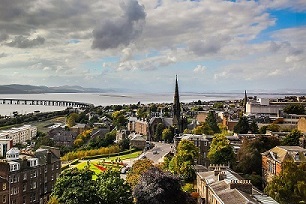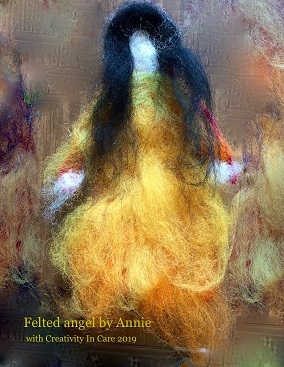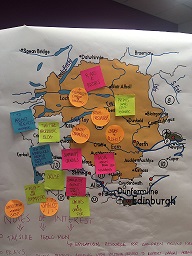Truacanta
The Truacanta Project ran from 2019-2023 supporting five local communities interested in taking community action to improve people’s experiences of death, dying, loss and care. On this blog, people associated with the project shared their experiences.
Truacanta Dundee
The shortlisted team in Dundee tell us more about themselves and their Truacanta vision.
The Dundee Truacanta representatives all hail from different organisations and backgrounds yet have come together with a common aim: to explore how we can create a more compassionate community response to death, dying, bereavement and care in Dundee through working together. Each of us had originally applied individually to work on a Truacanta project but were enthused and excited by the opportunity to form a partnership approach.
Our team comprises:
- Linda Sterry manages local charity Funeral Link who aim to prevent funeral poverty in Dundee by offering confidential support and helping the bereaved save money on all things related to funerals and in addition promote dialogue in preparation for funeral planning.
- Nicola Mitchell ​is the Older Peoples Services Development Officer with Dundee Voluntary Action who's remit is to support the Older Peoples Services Network and to provide older people in Dundee with information and opportunities around end of life planning and care. At a time when 1 in 10 people in Scotland often feel lonely and with 40% percent of Scots Pensioners living alone, she is keen that Dundee can become a Compassionate City to ensure that no one dies alone.
- Linda McSwiggan teaches at the University of Dundee and has a background in community nursing; she is keen to understand how universities and communities can best work together, on projects such as this one, to have greatest benefits for everyone.
It was clear when we first met that between the three of us we have a huge range of skills, experience and local contacts.

Even more clear was our drive and compassion to ensure that individuals who are dying are treated as compassionately as possible and that those who are bereaved have opportunities to access the sort of support that they may find helpful. From our early discussions, we have also already established that there are many other local organisations and individuals who are interested in joining us on this project.
During our first meeting it became apparent that just by putting our heads together there are lots of things already going on that the three of us are aware of, the toughest part of our application might be distilling down what exactly our proposal will encompass. We are all excited to be part of the Truacanta journey and to have the opportunity to take this initiative further to benefit the community in Dundee.
If you'd like to find out more or get involved, you can contact Linda Sterry at Funeral Link on linda@dfss.org.uk
Truacanta in the Highlands
One of our Shortlisted Communities is a partnership hoping to develop Truacanta work across the Highlands: Karrie Marshall tells us more.
Truacanta is a beautiful Gaelic word describing a sense of compassion and regard for one another. It is the quality of being humane. This is of particular importance when we are experiencing loss, grief and bereavement.
We all recognise how difficult the loss of a pet or a home or a loved one can be. Sometimes we are not sure how best to support one another during these times, even though we will all experience death and dying. This is why conversations are important… to be able to ask questions, or share ideas, or understand people’s needs as well as to be able to celebrate life.
Anne MacDonald at Highland Senior Citizens Network (HSCN) got in touch with Siobhan Neylon at Highland Hospice and Karrie Marshall at Creativity In Care to discuss how we could work together and be part of the Truacanta Project.

All three organisations are in regular contact with people who are living with long term conditions, or receiving care in their family homes, or in group homes. HSCN have Highland-wide Get-Togethers where various issues are discussed, and beneficial ideas are shared. Creativity In Care support family carers as well as individuals and community groups through the arts in health, expressing what matters most in life and in death. Karrie has also lectured in death and dying for care staff and families. The Hospice delivers sensitive education around practical aspects of planning for death and dying. The three organisations value individual and community resilience and will be linking with other organisations.
Initial talks have centred around the importance of
- listening to what people think about having these conversations
- finding out what sorts of questions people might have around death, dying, loss and care
- thinking about what compassionate communities might mean for each of us
- asking whether people think events that celebrate what matters in life would be helpful
A recent conversation with some of the members of HSCN showed a range of experiences and desires. Caroline Gibb, (Truacanta Project Manager) was there from Edinburgh. Some people have already created lists of important points about future care wishes. Some people would like to have very practical information that is in physical hard copy (not all on-line). Some people wondered whether any of us were qualified to talk about death and dying. Caroline answered the Truacanta view is that every person in the community is qualified to talk about death and dying.
Our next steps are meeting with people in three rural areas of the Highlands to hear more views.
If you'd like to find out more or get involved, you can contact Anne MacDonald on anne-hscn@outlook.com
Truacanta: Glasgow
Stephanie Hutchinson from Caledonia Cremation, Fiona Wylie from Prince and Princess of Wales Hospice and Ruth Forsythe from Finn’s Place have teamed up to work on a joint application to be a part of The Truacanta Project. Stephanie tells us more about how they are working together to build their vision.
Thanks to Caroline’s ‘big picture’ approach, two seemingly disparate Expressions of Interests have now joined forces under the Truacanta umbrella.
Initially I (Stephanie from Caledonia Cremation) had teamed up with Fiona Wylie from the Princes and Princess of Wales Hospice to submit our interest in exploring the cultural diversity within dying traditions, and finding ways of sharing those stories. For her book From Here to Eternity, Caitlin Doughty travelled the world to find the good death. We are content to travel the streets of Glasgow! Within our city there exists a remarkable cultural and ethnic diversity and it stands to reason that there is then a diversity in approaches to death and dying and rituals around grief and remembrance.
Our aim was to offer people a chance to share their dying traditions, a space to be heard and understood and perhaps then

to create a resource (be it a published book or booklet, website, short film, community event, exhibition of photos and items, or all of these mediums!) that would be useful to all the support organisations and services in the community eg: GPs, community link practitioners, social care workers, hospice teams, and help to inform their approach when working with members of different cultures.
Then Caroline connected us with Ruth Forsythe at Finn’s Place who, having held a very successful bereavement workshop, was keen to explore the ways in which the charity could expand its work in that area. Her thought was that the Capacitar sessions offered at Finn’s Place might be a way to do that. Capacitar is a Spanish word which means ‘to empower, to encourage, to build each other up’ and the sessions involve a blend of mind-body-spirit practices to support well-being and manage stress.
Having met and shared our respective ideas and aims, it’s been great to see the ways in which our ideas can complement each other. We are now in consultation with various organisations and communities to hold some exploratory events that involve inviting people of different cultural backgrounds to share their own cultural traditions around the process and event of death, and alongside offering the opportunity to share in some wellbeing practices that would then assist in processing emotions that may arise. We then plan to explore with participants how best we could capture their stories, ideally including them in the process of production.
Our hope is that this will lead to a broader understanding for all involved, of the approach to death and dying amongst the unique cultures and ethnic groups within Glasgow, which will in turn expand the capacity for compassion and connection. We also hope that by encouraging more open discussion around this, people have a better chance of learning about what practical support is available to them, for example, from their local hospice or community groups like Finn’s Place.
If you'd like to find out more or get involved, you can contact Stephanie on stephanie.hutchinson@caledoniacremation.org.uk
Truacanta Perth & Kinross
Shortlisted community Perth & Kinross tell us about their new partnership, and how they're working together to build their vision to be part of The Truacanta Project.
The wonderful thing about the Truacanta project is how it has already, at this early stage, drawn so many different people and teams together. When the news of the proposed project was shared, notes of interest were being posted from Perth and Kinross, and although we had all met before at conferences, events and followed each other on social media, we weren’t aware of each other’s approaches in thinking about Truacanta, and what being part of the project might bring.
Caroline contacted us with the good news that our collective notes of interest had been accepted, and we began to talk to each other. As we did, it became clear that collectively we really have a shared intent to work with the community to look at how loss, grief and bereavement affects so many individuals, from children, to young people who might be carers, to older people – ‘the third age.’

This has given us a great opportunity for some real partnership working, with Tayside Palliative and End of Life Care Managed Care Network looking at working with schoolchildren to capture their imagination in creating artwork around loss and grief, thinking about how some people are not going to get better, and what this means to them. This will raise awareness and enable people to speak positively into difficult situations. Through the children’s pictures and words, the aim is to promote human relational care and practical kindness as a key asset in compassionate communities. The artwork can then become a resource to be shared widely for people who have been bereaved.
PKAVS carers hub are hoping to establish better ways to support young and adult carers who may be looking after people with life-limiting conditions, through developing individuals to become counsellors who can work with people in exploring feelings of loss, grief and moving on after someone has died. This will be a development of PKAVS existing Bridge Project.
Dalweem is a care home in Aberfeldy, Perthshire and work has already begun there in connecting their largely rural community by creating a hub and drop-in café which will support people going through loss, grief and bereavement, and also those with a terminal diagnosis. Another community based idea is to provide training, workshops and signposting with the support of the District nurse team for those living at home to feel more involved and confident in caring for someone with a palliative or end of life diagnosis.
Perth and Kinross Health and Social care Partnership are hoping to build on existing resources and networks, and are looking at a check-in telephone service for people who live alone, and might be feeling isolated and lonely after a death of a loved one. Another idea to reach out and support people in the community after someone has died is to emulate the Irish tradition of a ‘months mind’, when a card or token gift could be sent four weeks after a death of a loved one.
-30.jpg)
When we got together to talk about our ideas, we found our shared values of compassion and humanity mirror the translation of Truacanta, and recognise that we all bring different experiences, skills and knowledge around loss, grief, bereavement, death and dying. We’re all really looking forward to taking this forward and working with the community. There is still much to be learned, but it feels like we are finding our way. There is another Scots Gaelic word which might describe this; camhanaich, which means both twilight and dawn, where there are some unknowns, but also much hope and exciting prospects ahead.
The main contact for Perth & Kinross is Emma Oram: EOram@pkc.gov.uk
Shortlisted Community: North Berwick
Deborah Ritchie, co-chair of North Berwick Coastal Health and Wellbeing Association, tells us about their next steps towards applying to be part of The Truacanta Project.
North Berwick Health and Wellbeing Association is delighted to be given the go ahead to develop a proposal to be a Compassionate Community. We have run a number of small events over the past few years. We have focused on public awareness events to enable us to start the conversations about death and dying and grief. We have hosted community days involving our local community choir and writing groups to perform to a ‘death café’. Our Community Council sponsored Remembrance Book in the library for local people to record the lives of their loved ones. We have screened Seven Songs for a Long Life and followed it up with conversation and cake. So we have made a few small steps to raise the issues and have involved a number of local groups. Our local Area partnership has funded some of these events and they are keen to help us to become a Compassionate Community.
We have lots of ideas on how we might take our next steps- probably too many ideas and we will need to be realistic in what we can achieve. We are all volunteers so we need to make sure that we have the capacity to take things forward. We would like to continue with the public awareness strand of our work, but add a strand about supporting people who are dying and the bereaved. We are currently piloting a tackling loneliness project and many lonely people are bereaved and find it difficult to reengage with their lives and community. We think these streams of work should complement each other. Our local GP who leads on palliative care has indicated that she would like to be involved, so we hope to find out what she would think is needed in our community.
We do want to identify our key messages about the need to have the big conversations about death and dying and to develop local networks of support so that nobody should die alone. We believe that the over medicalization of dying has meant that we have lost much community awareness and support. We also live in communities where people can become disconnected and isolated so through this work we would like to develop more community resilience and connection. I guess it is about reminding ourselves that we are human and compassionate and dying is part of all our living.